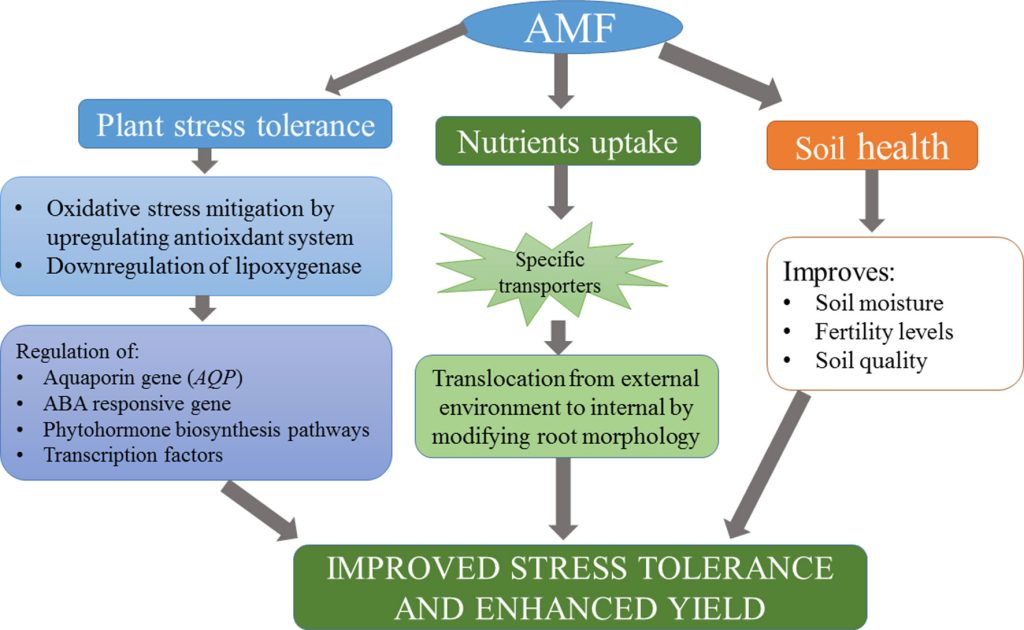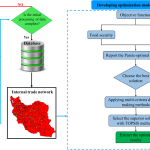Imagine transforming your farming practices to unlock the full potential of your crops. What if there was a natural ally beneath the soil, ready to boost your crop productivity without the need for synthetic additives?
This ally exists, and it’s called mycorrhiza. If you want your crops to thrive and yield better results, understanding the role of mycorrhiza in crop productivity is crucial. By the end of this article, you’ll discover how these tiny fungi can revolutionize your farming techniques, enhancing both your yield and soil health.
Dive in to explore how this partnership can be your secret weapon for maximizing crop success.

Mycorrhiza And Plant Nutrition
Mycorrhiza fungi enhance crop productivity by boosting nutrient uptake and improving soil health. These beneficial fungi form a symbiotic relationship with plant roots, increasing access to essential nutrients like phosphorus. This partnership leads to healthier plants and higher yields, benefiting farmers and the environment.
Mycorrhizae play a vital role in enhancing plant nutrition, significantly boosting crop productivity. These beneficial fungi form a symbiotic relationship with plant roots, extending their reach to access nutrients and water beyond the plant’s natural capabilities. By enhancing nutrient uptake, mycorrhizae help plants thrive even in nutrient-poor soils, offering an eco-friendly solution to improve agricultural yields.Understanding Mycorrhiza And Its Impact On Nutrient Uptake
Imagine a network of tiny threads working tirelessly underground to feed your plants. That’s essentially what mycorrhizae do. They expand the root surface area, allowing plants to absorb more nutrients like phosphorus and nitrogen. These nutrients are crucial for plant growth and development.How Mycorrhizae Enhance Phosphorus Availability
Phosphorus is often a limiting nutrient in many soils. Mycorrhizae help by breaking down organic material, releasing phosphorus in a form that plants can easily use. This is particularly beneficial in soils with low phosphorus availability, where plants might otherwise struggle.Boosting Nitrogen Uptake With Mycorrhizae
Nitrogen is another essential nutrient that mycorrhizae help plants acquire. By improving nitrogen uptake, mycorrhizae support the development of robust plants with lush, green foliage. This means healthier crops without the need for excessive nitrogen fertilizers.Improving Micronutrient Absorption
Beyond the major nutrients, mycorrhizae also aid in the absorption of essential micronutrients like zinc, copper, and iron. These micronutrients are vital for various plant processes. Without them, plants can suffer from deficiencies, impacting their growth and yield.Can Mycorrhizae Reduce Fertilizer Dependence?
With the help of mycorrhizae, you might find you need less fertilizer. This not only cuts down on costs but also reduces the environmental impact of excessive fertilizer use. Imagine the benefits of a more sustainable approach to farming where nature’s helpers do part of the work for you.Personal Experience: Seeing The Difference
In my backyard garden, I noticed a remarkable difference after introducing mycorrhizal inoculants. Plants that used to require frequent feeding were thriving with less attention. It was a game changer, proving that even small interventions can lead to significant improvements in plant health. Have you ever wondered how you could leverage nature’s own methods to enhance your garden’s productivity? Embracing mycorrhizal fungi might just be the key to unlocking your plants’ full potential. Give it a try and witness the transformation firsthand.
Enhanced Soil Health
Enhanced soil health is vital for sustainable agriculture. Mycorrhiza plays a crucial role in boosting soil fertility, benefiting plant growth. These beneficial fungi form symbiotic relationships with plant roots. As a result, they improve nutrient uptake, leading to better crop yields. Understanding how mycorrhiza enhances soil health can transform farming practices.
Improved Nutrient Cycling
Mycorrhiza boosts nutrient cycling in the soil. They help decompose organic matter faster. This process releases essential nutrients. Plants absorb these nutrients more effectively. This leads to stronger and healthier crops.
Increased Soil Structure
Mycorrhizal fungi enhance soil structure. They produce glomalin, a sticky protein. Glomalin binds soil particles together. This improves soil aeration and water retention. Improved soil structure prevents erosion.
Boosted Microbial Activity
Mycorrhiza increases microbial activity in the soil. They create a favorable environment for beneficial microbes. These microbes contribute to nutrient availability. They also help suppress soil-borne diseases. Healthy soil microbiomes promote resilient plant growth.
Enhanced Water Absorption
Mycorrhiza improves water absorption capabilities. They extend root systems, reaching more water sources. This is crucial during dry periods. Enhanced water absorption leads to better drought resistance. Crops remain productive even under water stress.
Disease Resistance Benefits
Mycorrhizae play a vital role in boosting crop productivity. They form a symbiotic relationship with plant roots, enhancing nutrient uptake. One of the key benefits is disease resistance. This natural alliance helps plants fight off pathogens.
Understanding Mycorrhizal Networks
Mycorrhizal networks connect plant roots with fungi. These networks help plants communicate and share nutrients. They also strengthen plant defenses against diseases. This interconnected system acts like a protective shield. It reduces the chances of pathogen attacks.
Enhancing Plant Immunity
Mycorrhizae improve plant immunity by stimulating defense mechanisms. They activate genes related to pathogen resistance. This makes plants more resilient to infections. The fungi produce compounds that deter harmful microbes. This creates an unfriendly environment for pathogens.
Reducing Disease Severity
Mycorrhizae can reduce the severity of diseases in crops. They limit the spread of harmful organisms in the soil. This containment minimizes damage to plants. The fungi also promote the growth of beneficial bacteria. These bacteria help suppress diseases naturally.
Improving Soil Health
Healthy soil is crucial for disease resistance. Mycorrhizal fungi improve soil structure and fertility. They enhance nutrient cycling and water retention. This creates optimal conditions for plant growth. Healthy soil supports strong, disease-resistant plants.
Boosting Crop Yield
Stronger plants with better disease resistance lead to higher yields. Mycorrhizae contribute to improved plant health and productivity. Farmers benefit from increased harvests and reduced losses. This natural solution is sustainable and eco-friendly.

Applications In Modern Agriculture
Mycorrhiza boosts crop productivity by enhancing nutrient absorption from the soil. These beneficial fungi form symbiotic relationships with plant roots. This connection improves water uptake and nutrient transfer, leading to healthier crops and increased yields.
Applications in Modern Agriculture In modern agriculture, mycorrhizae have emerged as invaluable allies in boosting crop productivity. These beneficial fungi form symbiotic relationships with plants, enhancing nutrient uptake and resilience. As you explore the applications of mycorrhizae, consider how these natural partnerships could transform your farming practices. ###Enhancing Nutrient Uptake
Mycorrhizae act like tiny underground networks, expanding the root system’s reach. They help plants access nutrients like phosphorus, nitrogen, and water more efficiently. Imagine the impact on your crops’ health and growth when they get the nutrients they need effortlessly. These fungi can reduce the need for chemical fertilizers. By tapping into natural nutrient sources, they promote sustainable farming practices. As a result, your soil remains healthier, supporting long-term productivity. ###Improving Soil Structure
Healthy soil is the foundation of successful farming. Mycorrhizae improve soil structure by binding soil particles together. This results in better aeration and water retention. Have you ever noticed how some fields stay moist longer after rain? That’s often due to improved soil structure. With mycorrhizae, your fields could experience similar benefits, reducing irrigation costs and improving crop yields. ###Boosting Plant Resilience
Plants face numerous stresses, from drought to pests. Mycorrhizae help plants withstand these challenges by enhancing their immune systems. This means your crops can survive tough conditions with less intervention. Imagine a season with unpredictable weather. Mycorrhizae can help your crops adapt, reducing the risk of total loss. By fostering this natural resilience, you can enjoy more consistent yields. ###Reducing Chemical Dependency
Many farmers are concerned about the environmental impact of chemical inputs. Mycorrhizae offer a way to reduce reliance on pesticides and fertilizers. They create a balanced ecosystem that naturally deters pests and diseases. By incorporating mycorrhizae, you not only protect your crops but also the environment. This shift can lead to a more sustainable and eco-friendly farming practice. ###Practical Implementation Tips
Start by testing mycorrhizal products on a small plot. Monitor the changes in crop health and yield. You may notice improvements that encourage broader application. Consult with agricultural experts or extension services for guidance. They can provide insights tailored to your specific crops and soil conditions. By gathering the right information, you can maximize the benefits of mycorrhizae. ###Are You Ready To Transform Your Farming?
Consider how mycorrhizae could fit into your agricultural practices. Could they be the key to unlocking higher yields and healthier crops? As you weigh the potential benefits, remember that these tiny fungi can have a big impact on your farm’s productivity.Conclusion
Mycorrhiza significantly boosts crop productivity. These fungi enhance nutrient absorption. They support plant growth naturally. Farmers benefit from healthier plants. Soil quality improves with mycorrhiza. Sustainable farming practices become easier. Reduced fertilizer usage helps the environment. It saves costs and promotes eco-friendly agriculture.
Mycorrhiza creates a balanced ecosystem. This partnership between fungi and plants is vital. Adopting mycorrhiza benefits crop yield. It ensures food security for future generations. Simple yet effective solution for agriculture challenges. Investing in mycorrhiza is a wise choice. It supports both crops and the planet.



